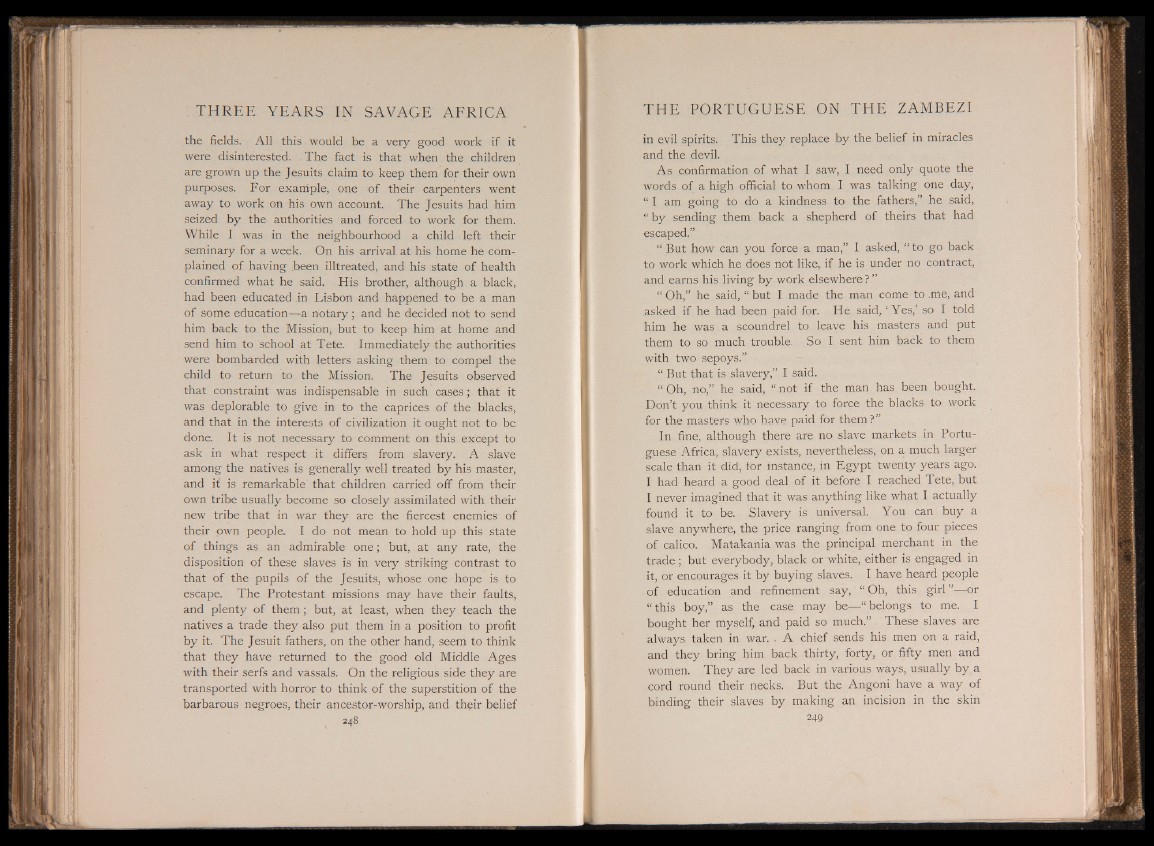
the fields. All this would be a very good work if it
were disinterested. The fact is that when the children
are grown up the Jesuits claim to keep them for their own
purposes. For example, one of their carpenters went
away to work on his own account. The Jesuits had him
seized by the authorities and forced to work for them.
While I was in the neighbourhood a child left their
seminary for a week. On his arrival at his home he complained
of having been illtreated, and his state of health
confirmed what he said. His brother, although a black,
had been educated in Lisbon and happened to be a man
of some education—a notary ; and he decided not to send
him back to the Mission, but to keep him at home and
send him to school at Tete. Immediately the authorities
were bombarded with letters asking them to compel the
child to return to the Mission. The Jesuits observed
that constraint was indispensable in such cases; that it
was deplorable to give in to the caprices of the blacks,
and that in the interests of civilization it ought not to be
done. It is not necessary to comment on this except to
ask in what respect it differs from slavery. A slave
among the natives is generally well treated by his master,
and if is remarkable that children carried off from their
own tribe usually become so closely assimilated with their
new tribe that in war they are the fiercest enemies of
their own people. I do not mean to hold up this state
of things as an admirable one; but, at any rate, the
disposition of these slaves is in very striking contrast to
that of the pupils of the Jesuits, whose one hope is to
escape. The Protestant missions may have their faults,
and plenty of them; but, at least, when they teach the
natives a trade they also put them in a position to profit
by it. The Jesuit fathers, on the other hand, seem to think
that they have returned to the good old Middle Ages
with their serfs and vassals. On the religious side they are
transported with horror to think of the superstition of the
barbarous negroes, their ancestor-worship, and their belief
248
in evil spirits. This they replace by the belief in miracles
and the devil.
As confirmation of what I saw, I need only quote the
words of a high official to whom I was talking one day,
“ I am going to do a kindness to the fathers,” he said,
“ by sending them back a shepherd of theirs that had
escaped.”
“ But how can you force a man,” I asked, “ to go back
to work which he does not like, if he is under no contract,
and earns his living by work elsewhere?”
“ Oh,” he said, “ but I made the man come to me, and
asked if he had been paid for. He said, ‘ Yes,’ so I told
him he was a scoundrel to leave his masters and put
them to so much trouble. So I sent him back to them
with two sepoys.”
“ But that is slavery,” I said.
“ Oh, no,” he said, “ not if the man has been bought.
Don’t you think it necessary to force the blacks to work
for the masters who have paid for them?”
In fine, although there are no slave markets in Portuguese
Africa, slavery exists, nevertheless, on a much larger
scale than it did, for instance, in Egypt twenty years ago.
I had heard a good deal of it before I reached Tete, but
I never imagined that it was anything like what I actually
found it to be. Slavery is universal. You can buy a
slave anywhere, the price ranging from one to four pieces
of calico. Matakania was the principal merchant in the
trade; but everybody, black or white, either is engaged in
it, or encourages it by buying slaves. I have heard people
of education and refinement say, “ Oh, this girl ||—or
“ this boy,” as the case may be—“ belongs to me. I
bought her myself, and paid so much.” These slaves are
always taken in war. . A chief sends his men on a raid,
and they bring him back thirty, forty, or fifty men and
women. They are led back in various ways, usually by a
cord round their necks. But the Angoni have a way of
binding their slaves by making an incision in the skin
249